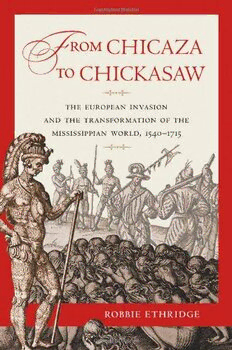
From Chicaza to Chickasaw: The European Invasion and the Transformation of the Mississippian World, 1540-1715 PDF
359 Pages·2010·6.013 MB·English
Most books are stored in the elastic cloud where traffic is expensive. For this reason, we have a limit on daily download.
Preview From Chicaza to Chickasaw: The European Invasion and the Transformation of the Mississippian World, 1540-1715
Description:
In this sweeping regional history, anthropologist Robbie Ethridge traces the metamorphosis of the Native South from first contact in 1540 by Hernando De Soto to the dawn of the eighteenth century, when indigenous people no longer lived in a purely Indian world but rather on the edge of an expanding European empire and in a new social landscape that included a large population of Europeans and Africans. Despite the fact that thousands of Indians died or were enslaved and virtually all Native polities were radically altered in these years, the collapse of this complex Mississippian world did not extinguish the Native peoples of the South but rather transformed them. Using a new interpretive framework that Ethridge calls the "Mississippian shatter zone" to explicate these tumultuous times, From Chicaza to Chickasaw examines the European invasion and the collapse of the precontact Mississippian world and the restructuring of discrete chiefdoms into coalescent Native societies in a colonial world. Within this larger regional context, she closely follows the story of one group--the Chickasaws--throughout this period. With skillfully synthesized archaeological and documentary evidence, Ethridge illuminates the Native South in its earliest colonial context and sheds new light on the profound upheaval and cultural transformation experienced by the region's first peoples.
See more
The list of books you might like
Most books are stored in the elastic cloud where traffic is expensive. For this reason, we have a limit on daily download.
